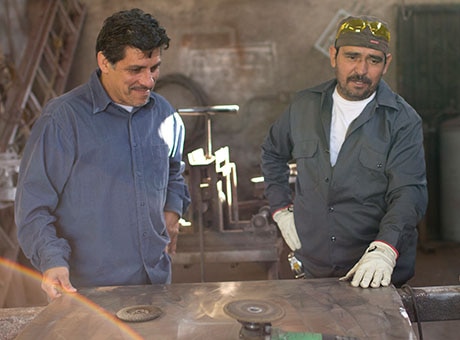You’re good with your hands, and maybe you have several years of experience working as a mechanic in other people’s garages, so now you feel as if it’s time to try your luck with a place of your own. You’ve got the “why” covered, but how to start an auto repair shop may still seem like a somewhat daunting challenge. Rest assured it isn’t. On top of the usual requirements for starting your own business, you have to meet some shop-specific needs to open a garage, plus you need to do the hard work needed for success.

How to Start an Auto Repair Shop From Scratch
Things Every Business Needs
Every new small business needs to get a few ducks in a row before opening its doors to the public. First, you need a plan. Writing a formal business plan, even if you don’t plan to show it to anybody, helps you bring your ideas into focus and develop a clear set of goals and benchmarks for success. Remember to update this document as your business grows so you can stay on track. Before you get to the auto shop-specific parts of your new business, you need to create a legal entity. This usually involves registering a unique name with the provincial government, and you may have to pay some fees and federal taxes. Talk to an expert in business law before you do this to make sure you’ve covered everything. Finding out later that you skipped a step can be an expensive and difficult surprise.
Your Shop-Specific Needs
When you have the paperwork done and filed, your business is free to open a bank account under its own name. Next, fill that account with enough start-up capital to get rolling. Grab a copy of your business plan, and sit down with a loan officer to see what you can borrow, if necessary. The optimum amount for your business loan varies with your location, planned size of the shop, and the amount of money you intend to contribute yourself. In general, you should raise enough money to purchase or lease the following:
- Diagnostic machine. This machine can be a selling tool in itself, pointing customers toward the services they need, so it’s a good investment for any shop. A working diagnostic computer can run between $5,000 and $10,000.
- Tools. Unless you have your own tool set, or your old boss is understanding about handing over the toolbox out when you quit, you need about $15,000 to purchase the tools you need. Don’t skimp here; your tools are your work, and you should buy the very best you can afford.
- Lift. Most modern shops have a lift, and many have several of them. Including installation, your lift is likely to cost around $4,000. Pay for professional installation to make sure it’s done right, since you don’t need the lift jamming on a busy workday.
- Shop space. You’re probably not planning to start your business in a canvas lean-to in your own backyard, so you need to rent shop space. Prices vary by location and size of the shop, but set aside $1,500 to $10,000 a month for rent or mortgage on your shop.
- Signage. Auto shops have to be accessible from the road, and it helps to put out a sign letting motorists know where you are. Add to this your initial get-the-word-out efforts, which might include printing flyers, creating promotional materials such as hats, and buying ad space. Your signage and promotional costs should hover in the low thousands.
- Public garage licence. Every car wash, gas station, or auto shop in Canada requires a license granted by the province or city in which it operates. Fees range from as low as $231 in many places to $410 in Toronto.
Adding up all these shop requirements shows that you must come up with about $40,000 before you’re ready to fix your first car. As with any financial projection, it’s a good idea to toss in an extra 10 to 15% for any unavoidable extra costs, taking the total up to about $50,000. To get this amount, you may have to borrow from more than one lender. Don’t be shy about doing this, but resolve to consolidate or pay off your highest interest loans as early as possible to keep your startup debt under control.
Should You Hire Employees?
Unless you have your heart set on starting a huge, full-service shop, you should probably hold off on hiring employees in the beginning. Canada has a lot of laws about hiring people, and there are rules for how they can work, what they get paid, and when they can be let go. Until you’re up to tackling that legal hill, try to keep up with the work yourself. When your shop has grown and you’re ready to hire, place your ad, interview carefully, and enjoy the feeling of giving back to your community by creating a job for an employee who might someday follow in your footsteps and start a shop of his own. At the very least, the lessons you’ve learned from starting your own shop can translate into good advice for the ambitious young mechanics you get started.


